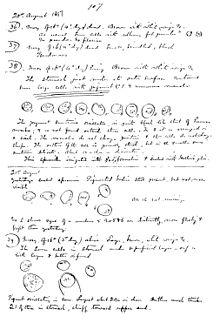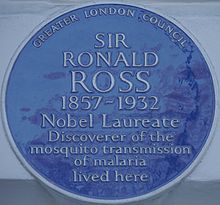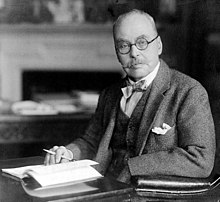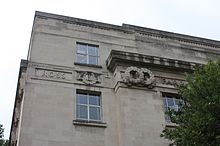Ronald Ross
St Bartholomew's Hospital Medical College Society of Apothecaries | |
|---|---|
| Known for | Discovering that the malaria parasite is transmitted by mosquitoes |
| Spouse |
Rosa Bessie Bloxam (m. 1889) |
| Awards |
|
| Scientific career | |
| Fields | Medicine |
| Institutions | British War Office Ministry of Pensions and National Insurance Ross Institute and Hospital for Tropical Diseases |
| Author abbrev. (zoology) | Ross |
Sir Ronald Ross
Ross was a
Early life and education
Ross was born in Almora, then in the North-Western Provinces of Company-ruled India, north west of Nepal.[1] He was the eldest of ten children of Sir Campbell Claye Grant Ross, a general in the British Indian Army, and Matilda Charlotte Elderton. At age eight, he was sent to England to live with his aunt and uncle on the Isle of Wight. He attended Primary schools at Ryde, and for secondary education he was sent to a boarding school at Springhill, near Southampton, in 1869. From his early childhood, he developed a passion for poetry, music, literature and mathematics. At fourteen years of age he won a prize for mathematics, a book titled Orbs of Heaven which sparked his interest in mathematics. In 1873, at sixteen, he secured first position in the Oxford and Cambridge local examination in drawing.[5]
Although Ross wanted to become a writer, his father arranged enrollment at
Career
India
Ross embarked for India on 22 September 1881 on the troopship Jumma. Between 1881 and 1894 he was variously posted in
Discovery of malaria-causing mosquito

Ross made his first important step in May 1895 when he observed the early stages of malarial parasite inside a mosquito stomach. However, his enthusiasm was interrupted as he was deployed to Bangalore to investigate an outbreak of cholera. Bangalore had no regular cases of malaria. He confided to Manson stating, "I am thrown out of employment and have 'no work to do'." But in April he had a chance to visit Sigur Ghat near the hill station of Ooty, where he noticed a mosquito on the wall in a peculiar posture, and for this he called it "dappled-winged" mosquito, not knowing the species. In May 1896, he was given a short leave that enabled him to visit a malaria-endemic region around Ooty. In spite of his daily quinine prophylaxis, he was down with severe malaria three days after his arrival. In June he was transferred to Secunderabad.[2][9]
After two years of research failure, in July 1897, Ross managed to culture 20 adult "brown" mosquitoes from collected larvae. He successfully infected the mosquitoes from a patient named Husein Khan for a price of 8

This day relenting God
Hath placed within my hand
A wondrous thing; and God
Be praised. At His command,
Seeking His secret deeds
With tears and toiling breath,
I find thy cunning seeds,
O million-murdering Death.
I know this little thing
A myriad men will save.
O Death, where is thy sting?
Thy victory, O Grave?
Discovery of malaria transmission in birds

In September 1897, Ross was transferred to Bombay, from where he was subsequently sent to a malaria-free
Ross immediately carried out research in malaria and Visceral leishmaniasis (also known as kala azar), for which he was assigned. He was given the use of Surgeon-Lieutenant-General Cunningham's laboratory for his research. He had no success with malarial patients because they were always immediately given medication. He built a bungalow with a laboratory at Mahanad village, where he would stay from time to time to collect mosquitoes in and around the village. He employed Mahomed (or Muhammed) Bux and Purboona (who deserted him after the first payday). As Calcutta was not a malarious place, Manson persuaded him to use birds, as being used by other scientists such as Vasily Danilewsky in Russia and William George MacCallum in America. Ross complied but with a complaint that he "did not need to be in India to study bird malaria". By March he began to see results on bird parasites, very closely related to the human malarial parasites.[15]
Using more convenient model of birds (infected sparrows), by July 1898 Ross established the importance of culex mosquitoes as intermediate hosts in avian malaria. On 4 July he discovered that the salivary gland was the storage sites of malarial parasites in the mosquito. By 8 July he was convinced that the parasites are released from the salivary gland during biting. He later demonstrated the transmission of malarial parasite from mosquitoes (in this case Culex species) to healthy sparrows from an infected one, thus, establishing the complete life cycle of malarial parasite.[16][17][18][19][20][21]
In September 1898 he went to southern
England

In 1899, Ross resigned from Indian Medical Service and went to England to join the faculty of the
Ross developed mathematical models for the study of malaria epidemiology, which he initiated in his report on Mauritius in 1908. He elaborated the concept in his book The Prevention of Malaria in 1910[27] (2nd edition in 1911) and further elaborated in a more generalised form in scientific papers published by the Royal Society in 1915 and 1916; some of his epidemiology work was developed with mathematician Hilda Hudson. These papers represented a profound mathematical interest which was not confined to epidemiology, but led him to make material contributions to both pure and applied mathematics.
Ross was one of the supporters of
Ross Institute and Hospital for Tropical Diseases
The Ross Institute and Hospital for Tropical Diseases was founded in 1926 and established at Bath House, a grand house with keeper's lodge and large grounds adjacent to Tibbet's Corner at
Nobel Prize

Ronald Ross was awarded a Nobel Prize for his discovery of the
When the 1902 Nobel Prize for Physiology or Medicine was considered, the Nobel Committee initially intended the prize to be shared between Ross and Grassi, however Ross accused Grassi of deliberate fraud. The weight of favour ultimately fell on Ross, largely due to the influences of Robert Koch, the appointed neutral arbitrator in the committee; as reported, "Koch threw the full weight of his considerable authority in insisting that Grassi did not deserve the honor".[33]
Personal life and death
Ronald Ross was noted to be eccentric and egocentric, described as an "impulsive man"[34] or an "impulsive genius."[35] His professional life appeared to be in constant feud with his students, colleagues, and fellow scientists.[36] His personal vendetta with G. B. Grassi became a legendary tale in science. He was openly envious of his mentor Patrick Manson's affluence from private practices. His Memories of Sir Patrick Manson (1930) was a direct attempt to belittle Manson's influences on his works on malaria.[8] He hardly had good ties with the administration of Liverpool School of Tropical Medicine, complaining of being underpaid. He resigned twice, and was eventually discharged without any pension.[37]

Ross was frequently embittered by lack of government support (what he called "administrative barbarism")
In 1889 Ross married Rosa Bessie Bloxam (d.1931). They had two daughters, Dorothy (1891–1947) and Sylvia (1893–1925), and two sons, Ronald Campbell (1895–1914) and Charles Claye (1901–1966). His wife died in 1931. Ronald and Sylvia pre-deceased him too: Ronald was killed at the Battle of Le Cateau on 26 August 1914.[40] Ross died at the hospital of his namesake after a long illness and asthma attack. He was buried at the nearby Putney Vale Cemetery, next to his wife.[41][42][43]
Legacy



A small memorial on the walls of SSKM Hospital, Calcutta commemorates Ross's discovery. The memorial was unveiled by Ross himself, in the presence of Lord Lytton, on 7 January 1927.[44] The laboratory where Ross worked has been transferred into a malaria clinic named after him. There is also a plaque on the outer wall.[45]

Sir Ronald Ross is one of 23 names to feature on the frieze of
A novel, The Calcutta Chromosome by Amitav Ghosh, published in 1995 is based on the life of Ross in Calcutta.[47]
Books
- Report on Cholera, General Sanitation, and the Sanitary Department and Regulations, in the C. & M. Station of Bangalore (1896)
- Report on the Cultivation of Proteosoma Labbé, in Grey Mosquitoes (1898). Digitised version available from National Library of Scotland.
- Report on the Nature of Kala-azar (1899). Digitised version available from National Library of Scotland.
- Malarial Fever: Its Cause, Prevention and Treatment; Containing Full Details for the Use of Travellers, Sportsmen, Soldiers, and Residents in Malarious Places (1902)
- First Progress Report of the Campaign Against Mosquitoes in Sierra Leone (with Charles Wilberforce Daniels) (1902)
- Notes on the Parasites of Mosquitoes Found in India Between 1895 and 1899
- Hygiene for Indian Scholars
- Note on the Bodies Recently Described by Leishman and Donovan (1903)
- Further Notes on Leishman's Bodies (1903)
- Report on Malaria at Ismailia and Suez (1903)
- Leishmania Donovani Found in Kala-azar (1904)
- Researches on Malaria (1905)
- Note on a Flagellate Parasite Found in Culex Fatigans (1906)
- Malaria in Greece (1909)
- Missionaries and the Campaign Against Malaria (1910)
- A Case of Sleeping Sickness Studied by Precise Enumerative Methods: Regular Periodical Increase of the Parasites Disclosed (with David Thomson) (1910)
- Discussion on the Treatment of Malaria (1918)
- Mosquitoes and Malaria in Britain (1918)
- Suggestions for the Care of Malaria Patients (1919)
- Observations on malaria (1919)
- Memoirs, with a Full Account of the Great Malaria Problem and Its Solution (1923)
- Malaria-control in Ceylon Plantations (1926)
- Solid Space-algebra: The Systems of Hamilton and Grassmann Combined (1929)
- A Summary of Facts Regarding Malaria Suitable for Public Instruction (with Malcolm Watson) (1930)
- Memories of Sir Patrick Manson (1930)
- The solution of equations by iteration (with William Stott) (1930)
- A Priori Pathometry (with Hilda Phoebe Hudson) (1931)
- Mosquito Brigades and How to Organise Them ISBN 978-1-2905-5311-7
Literary works
Ross was a prolific writer. He habitually wrote poems on most of the important events in his life. His poetic works gained him wide acclaim and they reflect his medical service, travelogue, philosophical and scientific thoughts. Many of his poems are collected in his Selected Poems (1928) and In Exile (1931). Some of his notable books are The Child of Ocean (1899 and 1932), The Revels of Orsera, The Spirit of Storm, Fables and Satires (1930), Lyra Modulatu (1931), and five mathematical works (1929–1931). He also compiled an extensive account The Prevention of Malaria in 1910 and another Studies on Malaria in 1928. He published his autobiography Memoirs, with a Full Account of the Great Malaria Problem and its Solution (547 pages long) in 1923. He carefully saved virtually everything about himself: correspondence, telegrams, newspaper cuttings, drafts of published and unpublished material, and all manner of ephemera.[4]
Awards and recognition


Ronald Ross was awarded the Nobel Prize for Physiology or Medicine in 1902 "for his work on malaria, by which he has shown how it enters the organism and thereby has laid the foundation for successful research on this disease and methods of combating it".[48]
20 August is celebrated by
He was elected a
Ross received honorary membership of learned societies of most countries in Europe, and elsewhere. He got an honorary M.D. degree in
In India, Ross is remembered with great respect as a result of his work on malaria, the deadly epidemic which used to claim thousands of lives every year. There are roads named after him in many Indian towns and cities. In
In
The University of Surrey, UK, has named a road after him in its Manor Park Residences.[51]
Ronald Ross Primary School near Wimbledon Common is named after him. The school's crest includes a mosquito in one quarter.[52]
Sir Ronald Ross Institute of Parasitology was established in memory of Ronald Ross in Hyderabad, under Osmania University.[53]
In 2010 the University of Liverpool named its new biological science building "The Ronald Ross Building" in his honour. His grandson David Ross inaugurated it. The building is home to the university's facility for the Institute of Infection and Global Health.[54]
See also
- Mosquito-malaria theory
- Albert Freeman Africanus King
- Paul de Kruif
- Plasmodium
- History of malaria
References
- ^ .
- ^ S2CID 10757525.
- ^ a b c d e f g "Ross and the Discovery that Mosquitoes Transmit Malaria Parasites". Centers for Disease Control and Prevention. 8 February 2010. Retrieved 31 January 2014.
- ^ a b c d "Sir Ronald Ross (1857–1932)". Dr. B.S. Kakkilaya's Malaria Web Site. Archived from the original on 19 March 2013. Retrieved 31 January 2014.
- ^ Ross, Sir Ronald (1923). Memoirs with a full account of The Great Malaria Problem and its Solution. Albemarle Street, W. London: John Murray. p. 24.
- ^ a b "Biography of Sir Ronald Ross". London School of Hygiene & Tropical Medicine. Archived from the original on 2 February 2014. Retrieved 28 January 2014.
- ^ "No. 25010". The London Gazette. 30 August 1881. p. 4453.
- ^ a b Lavery, Marck Bryan. "Malaria Wars Episode MDCCCXCVIII: Ronald Ross and the Great Malaria Problem" (PDF). evolve360. Archived from the original (PDF) on 21 February 2014. Retrieved 9 February 2014.
- ^ S2CID 207200295.
- PMID 29002928.
- PMID 20757493.
- PMID 18038083.)
{{cite journal}}: CS1 maint: DOI inactive as of January 2024 (link - PMID 17620616.
- ISBN 9780750301060.
- ^ Ross, Ronald (1898). Report on the cultivation of protesoma, Labbé, in grey mosquitoes. Calcutta: Superintendent of Govt. Printing. pp. 1–2.
- S2CID 32233983.
- PMID 10697833.
- S2CID 207200295.
- PMID 9373663.
- PMID 16636993.
- PMID 18940418.
- ^ "Laboc Hospital – A Noble Prize Winner's Workplace". easternpanorama.in. Archived from the original on 5 November 2013. Retrieved 11 July 2013.
- ^ @doctorsoumya (7 October 2017). "Ronald Ross worked here in Silchar- his chair and microscope intact, as well as drawings of mosquitoes! Should be a museum, not working lab!" (Tweet). Retrieved 7 October 2017 – via Twitter.
- ^ Ross, Ronald (12 December 1902). "Researches on malaria (Nobel Lecture)" (PDF). Nobel Prize. Retrieved 30 June 2022.
- ^ "My experiences in Panama / Sir Ronald Ross 1916". National Library of Medicine.
- JSTOR 768746.
- ^ Ross, Ronald (1910). The Prevention of Malaria. Dutton.
- ISBN 1853154970.
- ISBN 978-0-230-37754-7.
- ^ "1920 History Timeline | London School of Hygiene & Tropical Medicine | LSHTM". Timeline.lshtm.ac.uk. Retrieved 2 December 2012.
- PMID 20055226.
- PMID 20205846.
- ISBN 978-1-1394-6-4109.
- JSTOR 44445103.
- ^ Choudhury, Rakin (5 February 2020). "An Impulsive Genius: Sir Ronald Ross". Circadian. Retrieved 30 June 2022.
- ISBN 978-1-8510-9693-0.
- S2CID 73351882.
- ^ a b "LSHTM Archives Service Homepage". www.lshtm.ac.uk. Retrieved 4 October 2017.
- ^ a b "RCPSG/9 - Sir Ronald Ross (1857-1932), surgeon". Retrieved 13 August 2018.[permanent dead link]
- ^ Sherborne School Book of Remembrance on Flickr
- ^ "Ronald Ross". NNDB. Retrieved 13 December 2014.
- ^ "RONALD ROSS (1857–1932)". zephyrus. Retrieved 13 December 2014.
- S2CID 5106342.
- ^ Our Bureau (4 July 2014). "Malaria Poser Sting in Court". No. My Kolkata. The Telegraph. Archived from the original on 2 April 2015. Retrieved 28 February 2015.
- ^ a b Datta, Rangan (20 August 2023). "How Ronald Ross linked the mosquito bite to malaria parasites". No. My Kolkata. The Telegraph. Retrieved 21 August 2023.
- ^ "Sir Ronald Ross (1857-1932) | LSHTM". LSHTM. Retrieved 9 November 2018.
- PMC 4117097.
- ^ "Ronald Ross – Facts". Nobel Media AB. Retrieved 31 January 2014.
- ^ "World Mosquito Day". Malaria No More UK. Archived from the original on 2 February 2014. Retrieved 31 January 2014.
- ^ "Behind the Frieze | London School of Hygiene & Tropical Medicine | LSHTM". www.lshtm.ac.uk. Archived from the original on 2 February 2017. Retrieved 21 March 2017.
- ^ "Manor Park Residences" (PDF). University of Surrey. Archived from the original (PDF) on 19 February 2012. Retrieved 31 August 2009.
- ^ "Ronald Ross Primary School – Home". Ronaldross.org.uk. 22 November 2012. Retrieved 2 December 2012.
- ^ "Sir Ronald Ross Institute of Parasitoloy". Osmania.ac.in. Retrieved 2 December 2012.
- ^ "Opening of The Ronald Ross Building". Institute of Infection and Global Health, University of Liverpool. 10 October 2010. Retrieved 31 January 2014.
Further reading
- Ross, Ronald (2011) [1923]. Memoirs, with a full account of the great malaria problem and its solution. South Carolina: Nabu Press (originally John Murray, London). ISBN 978-1179199481.
- de Kruif, Paul (1996) [1926]. Microbe Hunters. San Diego: A Harvest Book. pp. 256–285. ISBN 978-0-15-602777-9.
- Malcolm Watson (1930). Ronald Ross, 1857–1932. Reprinted from Science Progress.
- James Oram Dobson (1934). Ronald Ross, dragon slayer: a short account of a great discovery and of the man who made it. Student Christian Movement Press, p. 112
- Nye, Edwin R.; Gibson, Mary E. (1997). Ronald Ross : Malariologist and Polymath : a Biography. New York: St. Martin's Press, Inc. ISBN 0-312-16296-0.
- Bynum, William F.; Overy, Caroline (1998). The Beast in the Mosquito: the Correspondence of Ronald Ross and Patrick Manson. Amsterdam: Rodopi. ISBN 978-9-0420-0731-4.
- Cook, G.C. (2007). Tropical Medicine an Illustrated History of the Pioneers. London: Academic Press. pp. 68–81. ISBN 978-0-08-055939-1.
External links
- Works by Ronald Ross at Project Gutenberg
- Works by Ronald Ross at Faded Page (Canada)
- Biography in The Britannica Encyclopedia
- Unveiling of a 'Blue Plaque' memorial to Ross at the University of Liverpool's Johnston Laboratories where he had worked
- Commemorative inscription
- Anecdotes from Ronald Ross' life
- Ross and the Birds in Steven Lehrer's website (archive)
- Royal Society citation (1901)
- Ronald Ross on Nobelprize.org
- Ross and the Discovery that Mosquitoes Transmit Malaria Parasites
- Ross's three part paper on the theory of epidemics is available on the web
- Ross, R. (1916). "An Application of the Theory of Probabilities to the Study of a priori Pathometry. Part I". Proceedings of the Royal Society A: Mathematical, Physical and Engineering Sciences. 92 (638): 204–226. .
- Ross, R.; Hudson, H. P. (1917). "An Application of the Theory of Probabilities to the Study of a priori Pathometry. Part II". Proceedings of the Royal Society A: Mathematical, Physical and Engineering Sciences. 93 (650): 212–225. .
- Ross, R.; Hudson, H. P. (1917). "An Application of the Theory of Probabilities to the Study of a Priori Pathometry.--Part III". Proceedings of the Royal Society B: Biological Sciences. 89 (621): 507. .
- Works by Ronald Ross at LibriVox (public domain audiobooks)

- Newspaper clippings about Ronald Ross in the 20th Century Press Archives of the ZBW
